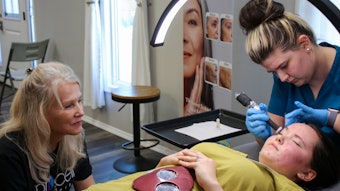
For many individuals, the opportunity to restore and rejuvenate the body and mind often comes through a soothing spa treatment. Safe in the hands of a talented spa therapist, guests can slowly pass over their senses and fall into a state of calm while they enjoy their treatment.
However, for the spa therapist whose role it is to relax, relieve and restore their clients, their own well-being may not be as aligned. In a role dedicated to caring for others, therapists are often over stretched with back-to-back appointments helping those in need. Due to their frequently busy schedule, many therapists forget to give themselves breaks throughout the day, or the right amount of time to rest and stretch in between clients. Especially considering spa therapists are on their feet most of the day, it is particularly important that breaks are frequent with therapists going outside with natural light when possible. Here are some top tips on how to look after your spa therapists’ well-being.
"If you take care of you employees, they will take care of you customers." - Richard Branson
Tip #1: Limit Therapist Treatment Hours
This is not to say reduce on the businesses’ operating hours nor make sacrifices on the number of possible clients. However, by limiting treatment hours per therapist to around five hours per therapist per day, this ensures their well-being and higher standard treatments. Most importantly, this can help to reduce staff burnout, as there is space between treatments for therapists to take breaks or get a moments breath. Not only this, but reduced treatment hours can in turn help to preserve guest satisfaction. Every guest should receive the best experience possible. However, this can be challenging and places additional pressure on therapists when they have reached exhaustion or are struggling to maintain their work flow.
Tip #2: Teach Therapists a Variety of Exercises
Repetitive Strain Injury (RSI) is a common issue, particularly among spa therapists due to the role’s repetitive nature. Spa managers should teach therapists a variety of hand strengthening exercises which can help prevent and protect against RSI. These are simple to do and can be performed easily after each client or throughout the day during breaks. Print-out reminders with simple demonstrations can be even placed in each therapist’s treatment room or the staff room for use during breakouts. You can even have therapists take turns and give each other short treatments.
Another important set of exercises to teach therapists are simple breathing exercises which can be done a few times a day. Breathing exercises are proven to help people relax if they are feeling stressed or over-worked, while increasing oxygen and the blood flow around the body.
Tip #3: Enforce Regular Staff Breaks
Spas are often extremely busy, particularly during peak times, whereby treatment slots are fully booked throughout the day. This can place extra pressure on therapists and often leave them without a break for hours.
As a spa manager, it is important to ensure your therapists have regular breaks. Scheduling day light breaks throughout the day is crucial to their well-being. Many therapists will go several hours without seeing any natural daylight, particularly if treatment rooms are underground, or just dark. This can lead to a deficiency in vitamin D and can even cause therapists to feel less energetic and motivated. With sunshine and light proven to boost the mood as well as the immune system, there will be a great difference to therapists’ work flow once they take regular breaks. Enforcing breaks for 10 to 15 minutes every two hours and a longer lunch break will be sufficient.
Tip #4: Provide Therapists With Adjustable Equipment
With therapists on their feet daily, treatments can be a strenuous and a physically demanding role. It is important that the treatment room is tailored for each therapist particularly for treatments which take place on lower equipment such as massage tables.
If therapists need to overstretch or hunch during treatments, their equipment is not at the correct height for them. For instance, a massage table should be able to be adjusted to accommodate the height of each spa therapist. This is essential to therapists’ posture and ability in their work, with such equipment easy to use, meaning it shouldn’t take too long for therapists to adjust as needed.
Tip #5: Ensure Therapists are Hydrated
Similar to taking regular breaks, many therapists forget to keep hydrated throughout the day with thoughts of drinking water overlooked.
As a spa manager, there are simple changes that can be implemented to ensure your team is keeping hydrated. Purchase each of your spa therapists their own water bottle and actively encourage them to drink water throughout the day. Having water fountains placed around the spa or in key areas, such as reception or the staff room, will help provide reminders that therapists can re-fill their bottle every few hours.
With therapists often working in warm rooms, sometimes without windows, it is essential to stay hydrated to avoid them feeling faint or lethargic.
Lastly, a strong workforce is your business’ greatest asset, and this shouldn’t be compromised. By ensuring that your team's well-being is at the forefront of any spa managers thoughts will have great benefits, not only for your employees motivation but business too. A happy workforce can contribute to lower sick days, higher motivation levels, confidence in their role and of course higher treatment standards. Showing that you care about your therapists will mean they care about your business even more!











